

package Creates a jar file containing the files in src/main/resources and the classes compiled from src/main/scala. The uTest syntax is based on the Scalatest FreeSpec style.
INTELLIJ JAR WITH OPTIONS HOW TO
This chapter takes you through how to use classes and objects in Scala programming. You can have multiple configurations for a dependency, separated by semicolons. First, use the ngrok dashboard to generate an API key. When I built my prototype, I wrote everything in a single notebook to quickly test things. 5 I right-clicked on the test/scala directory and selected 'Run->All Tests' this returned the output : 0 test class found in package ' There is also a popup which says: Tests were not found in module 'test-patterns-scala', Use module "test-patterns-scala-build" instead If an asterisk in the middle is not supported, it would be helpful if an error message was issued when editing. 0, the syntax for scoping keys has been unified for both the shell and the build definitions to the slash syntax as follows: lazy val root = (project in file(". If you have read the chapters and pursued the exercises, then you are already pretty good at defining classes, writing functions, and working with collections. none (Only one test at a time) But when I run all test in a testclass or package intellij shows red text "No tests were found" Using Intellij Ultimate 2020. Client) // only … The Java plugin adds a number of tasks to your project, as shown below. Even in Notepad, people have done java coding and by using the “javac” command to compile the java files, and they will … This issue happened to me recently when I was trying to run tests in an inherited Scala project using IntelliJ IDEA 2018 (Community Edition). 4) Downloaded the Community Edition ( Scala plugin also ) but Scala wont work with Community edition. See Deploying Java Applications to Heroku from Eclipse or IntelliJ IDEA to learn how to deploy from Eclipse, IntelliJ or a CI Server.0 test classes found in package scala size = 0) } } run $ sbt test on the project root Introduction Unless otherwise stated, we're using Scalatest 3.

If you are packaging your application with sbt-assembly, you can deploy that file by adding the following configuration to your build.sbt: herokuFatJar in Compile := Some((assemblyOutputPath in assembly).value) The sbt-heroku plugin has built-in support for sbt-assembly, which is the de facto tool for building Scala fat JAR files.

Make sure you add your Procfile changes to your Git repository. For example: web: java -jar target/myapp.jar You only need to define how to run it in the app’s Procfile.
INTELLIJ JAR WITH OPTIONS CODE
When you deploy your source code to Heroku with git push heroku master (as described in Deploying with Git), your JAR file will be included in your app’s slug. You can customize the deployment as described in Deploying Java Applications with the Heroku Maven Plugin. Then configure your process types to execute the JAR by adding some configuration like this: The Heroku Maven Plugin can be used as described in Deploying Java Applications with the Heroku Maven Plugin, but with the following configuration: false You can customize the execution of the JAR file by creating a Procfile or including additional files in the deployment. Then create an application: $ heroku create -no-remoteĪnd deploy your JAR file by running this command, replacing the app name ( sushi in this case) with the app name generated by the previous command: $ heroku deploy:jar target/my-app.jar -app sushi
INTELLIJ JAR WITH OPTIONS INSTALL
Then run this command to install the plugin: $ heroku plugins:install java To use it, you must have created a Heroku account and installed the Heroku CLI. The Heroku Java CLI plugin can deploy a pre-built JAR file with very little set up or dependencies.

This article shows several different techniques for deploying a fat JAR to Heroku. These artifacts are often called “uberjars” or “fat jars”. Many Java and JVM applications are packaged into a self-contained executable JAR file that includes application code, configuration and dependencies. Deployment with Scala, Clojure and Gradle.


 0 kommentar(er)
0 kommentar(er)
